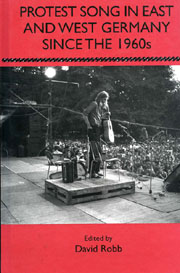Book contents
- Frontmatter
- Contents
- Acknowledgments
- Introduction
- 1 The Reception of Vormärz and 1848 Revolutionary Song in West Germany and the GDR
- 2 Mühsam, Brecht, Eisler, and the Twentieth-Century Revolutionary Heritage
- 3 Narrative Role-Play as Communication Strategy in German Protest Song
- 4 The Burg Waldeck Festivals, 1964–1969
- 5 The Folk and Liedermacher Scene in the Federal Republic in the 1970s and 1980s
- 6 Konstantin Wecker: Political Songs between Anarchy and Humanity
- 7 Wolf Biermann: Die Heimat ist weit
- 8 Political Song in the GDR: The Cat-and-Mouse Game with Censorship and Institutions
- 9 The Demise of Political Song and the New Discourse of Techno in the Berlin Republic
- Works Cited
- Notes on the Editor and Contributors
- Index
8 - Political Song in the GDR: The Cat-and-Mouse Game with Censorship and Institutions
Published online by Cambridge University Press: 05 February 2013
- Frontmatter
- Contents
- Acknowledgments
- Introduction
- 1 The Reception of Vormärz and 1848 Revolutionary Song in West Germany and the GDR
- 2 Mühsam, Brecht, Eisler, and the Twentieth-Century Revolutionary Heritage
- 3 Narrative Role-Play as Communication Strategy in German Protest Song
- 4 The Burg Waldeck Festivals, 1964–1969
- 5 The Folk and Liedermacher Scene in the Federal Republic in the 1970s and 1980s
- 6 Konstantin Wecker: Political Songs between Anarchy and Humanity
- 7 Wolf Biermann: Die Heimat ist weit
- 8 Political Song in the GDR: The Cat-and-Mouse Game with Censorship and Institutions
- 9 The Demise of Political Song and the New Discourse of Techno in the Berlin Republic
- Works Cited
- Notes on the Editor and Contributors
- Index
Summary
Media assessments have often projected an erroneous, undialectical image of the GDR political song scene in which art and creativity were simply sacrificed to censorship. On the one hand there are Wolf Biermann, Bettina Wegner, Gerulf Pannach, and Stephan Krawczyk who were banned and — albeit under varying circumstances — forced to leave the GDR for the West. On the other hand there is the Oktoberklub, showpiece of the FDJ-Singebewegung, which performed for years in the ideological service of the state. But just as in the GDR literature scene, the reality of the Liedermacher was more contradictory. Between the dissidents and the loyal Singeklubs there existed a substantial middle ground of critical Liedermacher in the GDR who cannot be slotted into these opposing categories of rebels and conformists. These include Hans-Eckardt Wenzel and his group Karls Enkel, Duo Sonnenschirm, Udo Magister, Pension Volkmann, Gerhard Gundermann, Gerhard Schöne, Barbara Thalheim, and many more.
From the 1960s right up until the Wende of 1989 political song was a popular and important cultural force in the GDR. The attraction for many fans lay in the singers' exploitation of a basic contradiction within GDR cultural policy. On one hand political song was nurtured at an official level as a proudly coveted Erbe of revolutionary tradition. On the other hand it was constantly viewed with suspicion due to its potential as a means of subversion. Faced with this contradiction, GDR singers trod a precarious tightrope between prohibition and tolerance.
- Type
- Chapter
- Information
- Protest Song in East and West Germany since the 1960s , pp. 227 - 254Publisher: Boydell & BrewerPrint publication year: 2007



